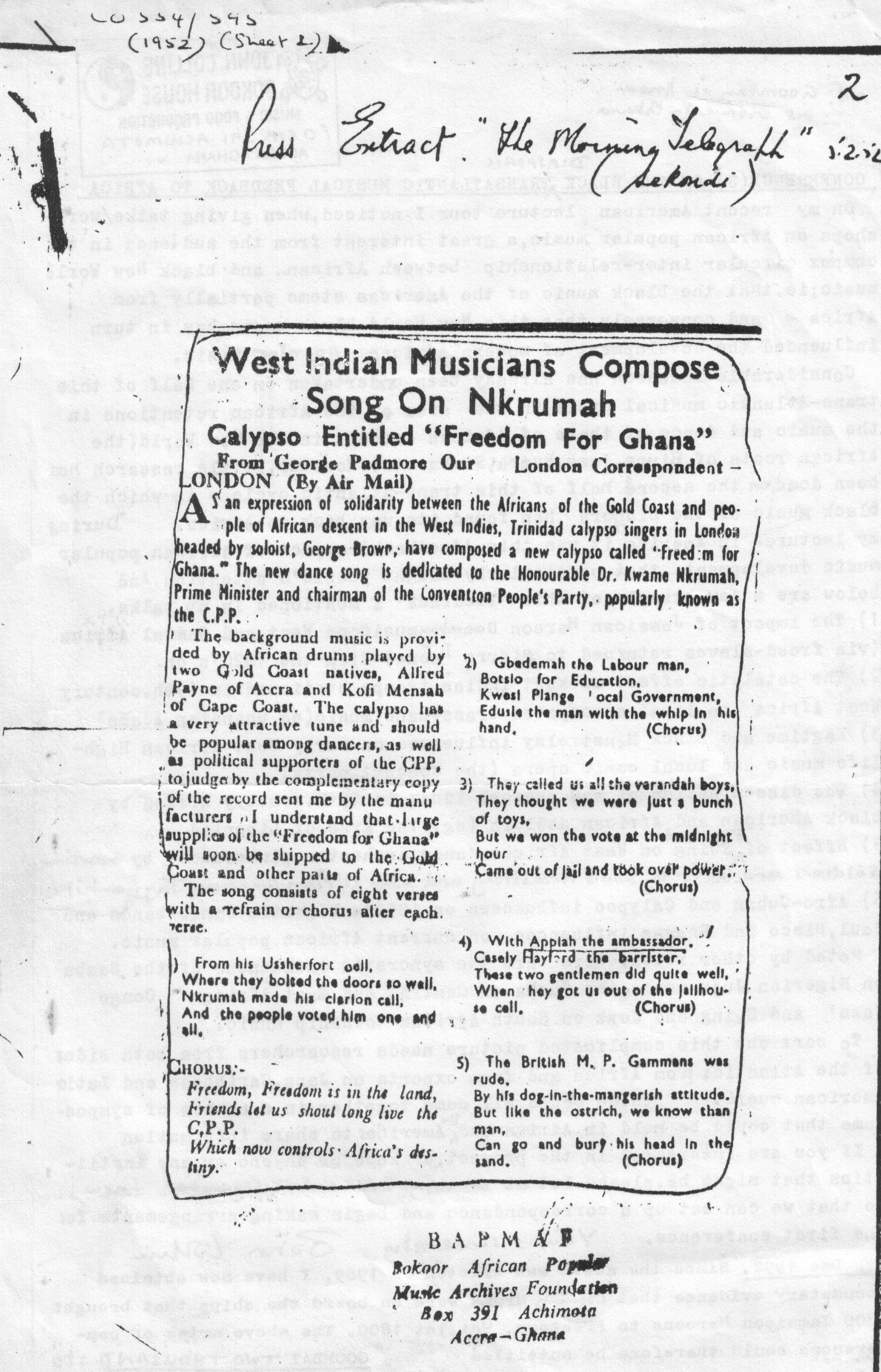George Browne “Freedom for Ghana”

Annotation
While living in London in the early 1950s, the Trinidadian calypsonian George Browne (whose stage name was Young Tiger) penned a calypso called “Freedom for Ghana” that caught the attention of George Padmore, the Trinidadian pan-Africanist intellectual and journalist, who wrote about it in the Ghanaian newspaper The Morning Telegraph (Sekondi) in this article from February 5, 1952. Browne was joined by two musicians from the Gold Coast, a fairly common occurrence in African diasporic bands popular in London. The song praises the Ghanaian leader Kwame Nkrumah who had been released from jail a year before, following his Convention People’s Party’s (CPP) stunning election victories. Nkrumah had become a symbol of Black Nationalism and pan-Africanism. In addition to informing listeners of some of the key figures in the CPP, the song’s lyrics demonstrate the connection that London-based Trinidadian and Ghanaian musicians felt with the CPP’s efforts in Gold Coast. The first-person pronouns seemingly indicate that, despite being in London, Browne and his bandmates viewed themselves as part of the movement. The line “they called us all the verandah boys” can be interpreted that they considered themselves one with the CPP’s supporters in Gold Coast. Historian Roger Gocking wrote that the term “verandah boys” had been used derisively in the colony to refer to the “farmers, petty traders, drivers, artisans, schoolteachers, clerks and letter writers” and others among the masses that had found themselves out of work and unable to find jobs. Many did not have homes and therefore had to sleep on the verandahs of roadside trading houses. Nkrumah had become so popular in large part due to his travels around the colony where he reached out to these groups among the masses. Therefore, the “verandah boys” lyric would have resonated with those individuals and their families who had experienced unemployment and homelessness.
This source is part of the teaching module on music and decolonization in the Black Atlantic.
Transcription
West Indian Musicians Compose Song On Nkrumah
Calypso Entitled "Freedom For Ghana"
From George Padmore Our London Correspondent - LONDON (By Air Mail)
As an expression of solidarity between the Africans of the Gold Coast and people of African descent in the West Indies, Trinidad calypso singers in London headed by soloist, George Brown, have composed a new calypso called "Freedom for Ghana." The new dance song is dedicated to the Honourable Dr. Dwame Nkrumah, Prime Minister and chairman of the Conventton People's Party, popularly known as the C.P.P.
The background music is provided by African drums played by two Gold Coast natives, Alfred Payne of Accra and Kofi Mensah of Cap Coast. The calypso has a very attractive tune and should be popular among dancers, as well as political supporters of the CPP, to judge by the complementary copy of the record sent me by the manufacturers. I understand that large supplies of the "Freedom for Ghana" will soon be shipped to the Gold Coast and other parts of Africa.
The song consists of eight verses with a refrain or chorus after each verse.
1) From his Ussherfort cell, Where they bolted the doors so well, Nkrumah made his clarion call, And the people voted him one and all,
CHORUS: Freedom, Freedom is in the land, Friends let us shout long live the C.P.P. Which now controls Africa's destiny.
2) Gbedemah the Labour man, Botslo for Education, Kwesl Plange local Government, Edusie the man with the whip in his hand. (Chorus)
3) They called us all the verandah boys. They thought we were just a bunch of toys. But we won the vote at the midnight hour Come out of jail and took over power. (Chorus)
4) With Applah the ambassador. Casely Hayford the barrister. These two gentlemen did quite well When they got us out of the jailhouse cell. (Chorus)
5) The British M.P. Gammens was rude. By his dog-in-the-mangerish attitude. But like the ostrich, we know than man, Can go and bury his head in the sand. (Chorus)